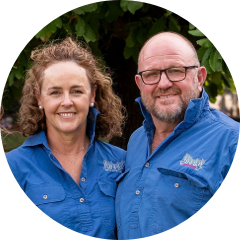On farm water management planning
Term
2023-2025
Project Officer
Sayra Samudio
WHY THIS PROJECT IS NEEDED
Water is one of the most critical resources for farming. With increasing climate variability and more frequent dry seasons, efficient on-farm water use is essential for sustaining productivity and building resilience.
This project aims to help farmers develop farm water management strategies to improve water quality, maintain livestock health, and preserve soil and natural assets.
A Farm Water Management Plan (FWMP) helps identify current and future water needs, assess supply capacity, and make informed decisions about storage using dams, tanks, and waterways — especially during dry times.
Project focus
This project supports landholders to develop and implement Farm Water Management Plans through workshops and small group follow-up sessions. The program guides participants through key aspects of water planning, including budgeting, legislative requirements, storage and reticulation options, water quality improvements, and ways to enhance natural capital on the farm.
Farmers assess their current and future water needs and identify practical opportunities to increase storage capacity, fence dams and riparian areas, and design water delivery systems that improve farm resilience and support livestock health.
Field days held at demonstration sites across the Murray region showcased water planning outcomes and practical design options and were delivered by farm water expert Peter Smith from Sapphire Irrigation.
Project outcomes
Podcast: On-farm water management planning
.png?width=118&height=127&name=On-farm%20water%20management%20(2).png) When rainfall drops and dams run low, keeping water clean and reliable becomes everyone’s challenge.
When rainfall drops and dams run low, keeping water clean and reliable becomes everyone’s challenge.
Riverine Plains’ Sayra Samudio recently chatted with irrigation consultant Peter Smith and district vet Elke Erregger about practical water management, from quality checks to quick fixes and longer-term upgrades. Listen here .
Planning your farm water management strategy
Effective planning is the foundation of good water management. These two short webinars guide you through the planning process, from understanding your farm’s water needs to using practical tools and templates to build your own Farm Water Management Plan.
Part 1: Introduction to water planning
This session covers mapping farm water infrastructure, estimating water needs and storage capacity, and planning for drought, including common losses like evaporation and seepage.
Part 2: Know your flow – getting the water to where and when you need it
This session focuses on water delivery — exploring efficient, reliable options to get water where and when it's needed across your property.
Resources from the webinars
Use the following tools and references to support your farm water management planning. These were mentioned during the webinar sessions and are available to download or access online.
Planning tools:
- Example Plan – A completed Farm Water Management Plan for a fictional farm, used as a reference in the webinars.
- Plan Template – A blank template to start building your own water management plan.
- Plan Workbook – A version of the template that includes a worked example to guide you step-by-step.
- Workshop Tools – A set of practical tools to support water planning activities
- AgGuide – Farm Water – A comprehensive farm water guide. If you’d like a printed copy, please contact Sayra at sayra@riverineplains.org.au. To purchase the PDF version, visit: AgGuide – Farm Water.
- Measuring the depth of your dam – Estimating your dam capacity
- Ag Vic Water calculator – Calculate farm water needs and storage capacity
Drought & risk management resources:
- Drought Template – A simple tool to help plan for drought scenarios.
- Managing Drought, Fire, and Flood Manual – A practical guide for preparing and responding to natural hazards on the farm.
Further support & information:
- Sustainable Farm Dams Module – An online learning module from Tocal College to deepen your understanding of farm dam planning.
- Natural Resources Access Regulator (NRAR) – Ensures legal and fair water use in NSW.
- Rural Financial Counselling Service (RFCS) – Free financial counselling for farmers facing hardship.
- ANU Sustainable Farms Resources – Research-based guides for enhancing farm water systems:
- Enhancing Farm Dams – Practical ways to improve dam function and ecosystem value
- Farm Dams Technical Guide – A detailed resource on dam planning and management
- Farm Dam Planting Guide – The right plants to use and where to use them
Farmer experiences of enhancing farm dams
This short video with Matt Lieschke from NSW Local Land Services describes a landowner experience of fencing to protect dam water supply and quality.
On Neil Hamilton’s Maragle property (between Tumbarumba and Tooma) the multiple benefits of securing stock and domestic water supply are on display. This video highlights the advantages and benefits to be gained by enhancing farm dams.
Find out more
For further information about this project, please contact Riverine Plains Extension Officer Sayra Samudio by emailing sayra@riverineplains.org.au.
Project investment
This is a Southern NSW Drought and Innovation Hub project funded by the Australian Government’s Future Drought Fund.
Partners
Project led by NSW Local Land Services, project partners include Holbrook Landcare Network, Western Murray Land Improvement Group, West Hume Landcare, Ricegrowers' Association and Corowa District Landcare.
MORE ON Drought & Livestock
Our research enhances food production, increases environmental resilience and improves community connection across the Riverine Plains. See how our research creates impact.
-
Livestock
Sustainability
-
Grains
Livestock
-
Grains
Livestock
-
Drought
-
Drought
-
Sustainability
Drought
-
Drought
Livestock
-
Livestock
Fodder
-
Drought
Grains
-
Livestock
Drought
-
Drought
Livestock
-
Drought
Livestock
-
Drought
People
-
Livestock
Grains
JOIN RIVERINE PLAINS
Riverine Plains provides opportunities to see new research and innovation, connect with rural communities, and attend informative events.


